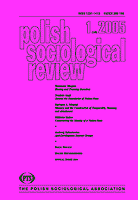Memory and the Construction of Temporality, Meaning and Attachment
Memory and the Construction of Temporality, Meaning and Attachment
Author(s): Barbara A MisztalSubject(s): Social Sciences
Published by: Polskie Towarzystwo Socjologiczne
Keywords: memory; temporality; meaning; solidarity; past; interactionism
Summary/Abstract: This paper argues that the continuing influence of the Durkheimian tradition in the sociology of memory has left us with three negative legacies. The first weakness of the Durkheimian perspective is its neglect of the question how individual consciousness might relate to group memory and its exclusive focus on the collective nature of social consciousness. The second criticism of this tradition refers to its concern with the legitimising function of collective memory, seen as providing the temporal and cognitive map which ensures the group’s identity and continuity. Its third negative legacy is its focus on the normative function of memory. The paper shows how three main weaknesses of the Durkheimian legacy can be overcome by the employment of the central notions of interactionism. It proposes that memory should be conceptualised as being intersubjectively constituted and that we should analyse the act of remembering as an interactive activity in which we interpret and assign meaning to past events. After discussing the role of remembering as an inherently creative and generative process in the construction of meaning, the paper explores the part memory plays in the construction of moral order. It concludes that the relationship of the past to values is essential but it only through assigning meanings to past events that the past may shape our principles of action.
Journal: Polish Sociological Review
- Issue Year: 149/2005
- Issue No: 1
- Page Range: 31-48
- Page Count: 17
- Language: English

